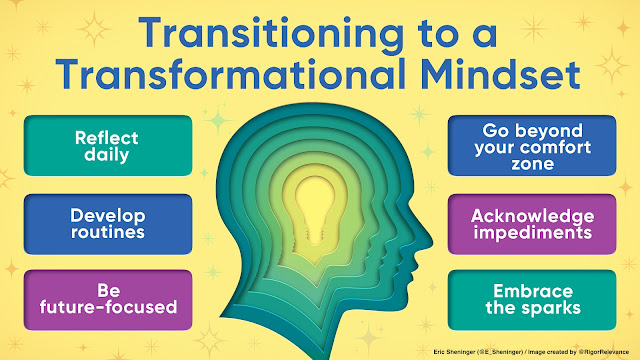The concept of how one’s mindset plays a crucial role in growth and change is nothing new. However, there are different ways to look beyond just fixed vs. growth. I shared the following in Disruptive Thinking in Our Classrooms:
A mindset is an attitude, disposition, or mood with which a person approaches a situation. In short, it’s a belief that determines the decisions we make, actions that are undertaken, and how situations are handled. How we think and act can help us identify opportunities for improvement. Mindsets can also function as a roadblock to progress. Our natural apprehension and fear associated with change inhibits our ability to pursue new ideas and implement them with fidelity. For sustainable change to take root and flourish, there must be a belief that our actions can significantly improve outcomes. The best ideas come from those who constantly push their thinking as well as the thinking of others.
In essence, it is a broad concept that can help algin to virtually any means to grow and improve. As disruption moves at a frenetic pace in our world today, it is vital to transform how we do things. The right mindset can make or break this journey. Here are some thoughts on transitioning to a transformational mindset.
Reflect daily
Your mindset can change regularly, and this is a good thing. One of the most powerful tools any person has is the ability to reflect on not only what doesn’t go right but also everything that goes well in relation to professional practice. People who possess a transformational mindset don’t find the time to reflect; they make the time. Consistency is key.
Develop routines
While daily reflection can become one routine, it is also critical to incorporate others into the fold. Herein lies the “secret sauce” when it comes to changing behaviors that might have an adverse impact on progress. As a principal, I ensured email was checked first thing in the morning and before leaving for the day. I also made sure to draft my daily communication to staff and have this pushed out prior to first period. Since my calendar was originally my nemesis, I made it an asset where time was blocked off after every observation to immediately write it up so the post-conference could be held the next day. These and many other routines played a considerable role in developing a transformational mindset as more time was available to focus on the bigger picture.
Be future-focused
Dwelling on the past and constantly putting our eggs in the same basket over and over has the potential to hold us and others back. Focusing too much on the present can cloud our ability to prepare for the unknown. In a disruptive world where exponential change is and will always be the norm, we must have an eye on the future. A transformational mindset embraces a thought process about the future, anticipates potential obstacles, and assists with developing a tentative plan.
Go beyond your comfort zone
Comfort is the enemy of progress. Here are some thoughts I shared in the book:
An aspect of human nature is that when we are in a state of comfort, there is no real urgency to do something differently or better. These mental habits lead to the creation of comfort zones that we rarely step outside of. Why should we if everything is great, right? Or so our mind has us believe in a false dichotomy. The result is that we often then reside in a zone that is most comfortable, resulting in risk-averse behavior that impedes personal and professional progress. What typically morphs are fallbacks on some of the most dangerous phrases in any profession such as that’s the way we have always done it, or it’s always worked this way.
A transformational mindset pushes each of us to be honest about where we are in order to get to where we need to be to move needed change forward.
Acknowledge impediments
While this might seem a bit obvious, a fixed mindset prevents us from openly acknowledging what might set us back from achieving bold goals. Our fear of failure in the face of challenges can stymie growth even more than being comfortable. Impediments will always be there and that’s a fact. The only way to move past or conquer them is to be honest about their existence.
Embrace the sparks
Motivation and inspiration come in many forms. No matter how they materialize, the result can be sparks that serve as needed catalysts for transformational change. While the “yeah buts” can invoke fear or a sense of comfort that inhibit growth a shift in focus on the “what ifs” can serve as the fuel transforming a spark into something extraordinary. Never discount even the smallest of wins, as these often have the most significant impact in the long run.
Don’t fixate on what you can’t control. Instead, put your energy and time into making tweaks to your thought process to unlock your potential and eventually those you serve or support.

No comments:
Post a Comment